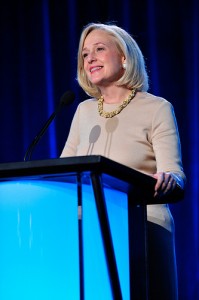 PBS chief Paula Kerger rode to the TV Critics Association fresh on the success and Golden Globe nominations for “Downton Abbey” and the burgeoning publicity for season two, which starts Sunday.
PBS chief Paula Kerger rode to the TV Critics Association fresh on the success and Golden Globe nominations for “Downton Abbey” and the burgeoning publicity for season two, which starts Sunday.
And though she said it was averaged more than 4 million viewers a week “Downton” was only “the third most watched ‘Masterpiece’ in the last 22 years.”
In addition to the andicipated new season, she said, “we have a special treat.” A documentary special Jan. 22, “Secrets of the Manor House” will look into the lives of British aristocracy in the early 1900s.
The success of the series have made some suddenly take note of PBS and make the dubious claim that it is suddenly trying to be on par with HBO in quality.
“It’s funny how many people have said to me, ‘Oh, PBS looks cool again,’” Kerger says, adding “I’ve always thought PBS was cool.
“When you do have a project that’s successful, and in this case, which is part of an overall strategy for us to really take a hard look at our schedule in primetime and figure out, you know, where are the opportunities for us to build programming that will be of interest in the American public and, frankly, that aren’t be well covered by other broadcasters, it provides great opportunities,”she says.
“We are really trying to look for opportunities where we can introduce public broadcasting to a whole new audience,” she says. Hits like ‘Downton’ are “a big opportunity to reintroduce people to public broadcasting. And I think that there are a lot of similarities between a service like HBO and PBS because we both produce quality programming.”
The two networks were also entwined when Ken Burns’ last production, “Prohibition” premiered about the same time that HBO’s drama “Boadwalk Empire” started its second season last fall.
“It was it was really kind of fun to look at the two shows side by side and look at the ways, frankly, the ‘Boardwalk Empire’ guys got the story right and grounded so much of what was a fictional series in history. And I think for people that were interested in that point of time or knew very little about it and were perhaps introduced to it through ‘Boardwalk Empire,’ having the ‘Prohibition’ series available just gave people a deeper dive into that part of our history.”
The notice for PBS comes at a time when politicians are making noises about cutting funding, most recently from Mitt Romney.
“The federal investment in public broadcasting amounts to about $1.35 a person a year. I used to say that would be the price of a cup of coffee but most places it’s not,” Kerger says. “The one group that elected officials listen to are their constituents, and if the constituents believe in the work that we do and I know that they do then they need to let their voices be heard.”
As for the suggestion that ads run in “Sesame Street,” she cited federal studies that said “it would be impossible for us to become a broadcaster that was not at least supported in part by a federal appropriation.”
“Many people on Capitol Hill would occasionally say, ‘Well, you know, there are cable operations like [the] History [Channel]. Maybe could learn from them in terms of bringing in revenue.’ But, you know, they found that the way to survive was to create a very different type of programming. “And programming like ‘Pawn Stars’ and ‘American Pickers’ is not the same as ‘American Experience’ and Ken Burns.”